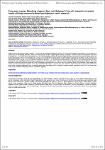From peer to peer: Reaching migrants from sub-Saharan Africa with research on sexual health utilizing community-based participatory health research
Koschollek, Carmen
Kuehne, Anna
Amoah, Stephen
Batemona-Abeke, Helene
Dela Bursi, Taty
Mayamba, Pierre
M'bayo, Rosaline
Mputu Tshibadi, Christina
Parris, Garnet
Thorlie, Adama
Wangare Greiner, Virginia
Bremer, Viviane
Santos-Hövener, Claudia
Migrants from sub-Saharan Africa (misSA) in Germany are disproportionally affected by HIV. To develop targeted interventions, it is necessary to collect data on knowledge, attitudes, behaviour and practices (KABP) regarding HIV and sexual health. However, misSA are difficult to reach and to sample: a) it is unknown how many people with an African migration background are living in Germany, and b) HIV and sexual health topics are highly stigmatized in these communities. We utilized a community-based participatory health research approach to develop a study protocol and conducted a KABP survey on HIV and sexual health among misSA in six German cities between 2015 and 2016. A convenience sample of 2,879 participants was recruited by 99 trained peer researchers through outreach in their local communities. Due to steering of recruitment, the study population reflected the official registered misSA population well and was diverse in terms of sociodemographic characteristics. Peer researchers mainly recruited participants that were similar to themselves with regard to gender, age and regions of origin. Male and younger peer researchers more often recruited participants from vulnerable sub-groups like migrants with a probably undocumented legal status who could not have been reached by probability sampling based on population registers.

